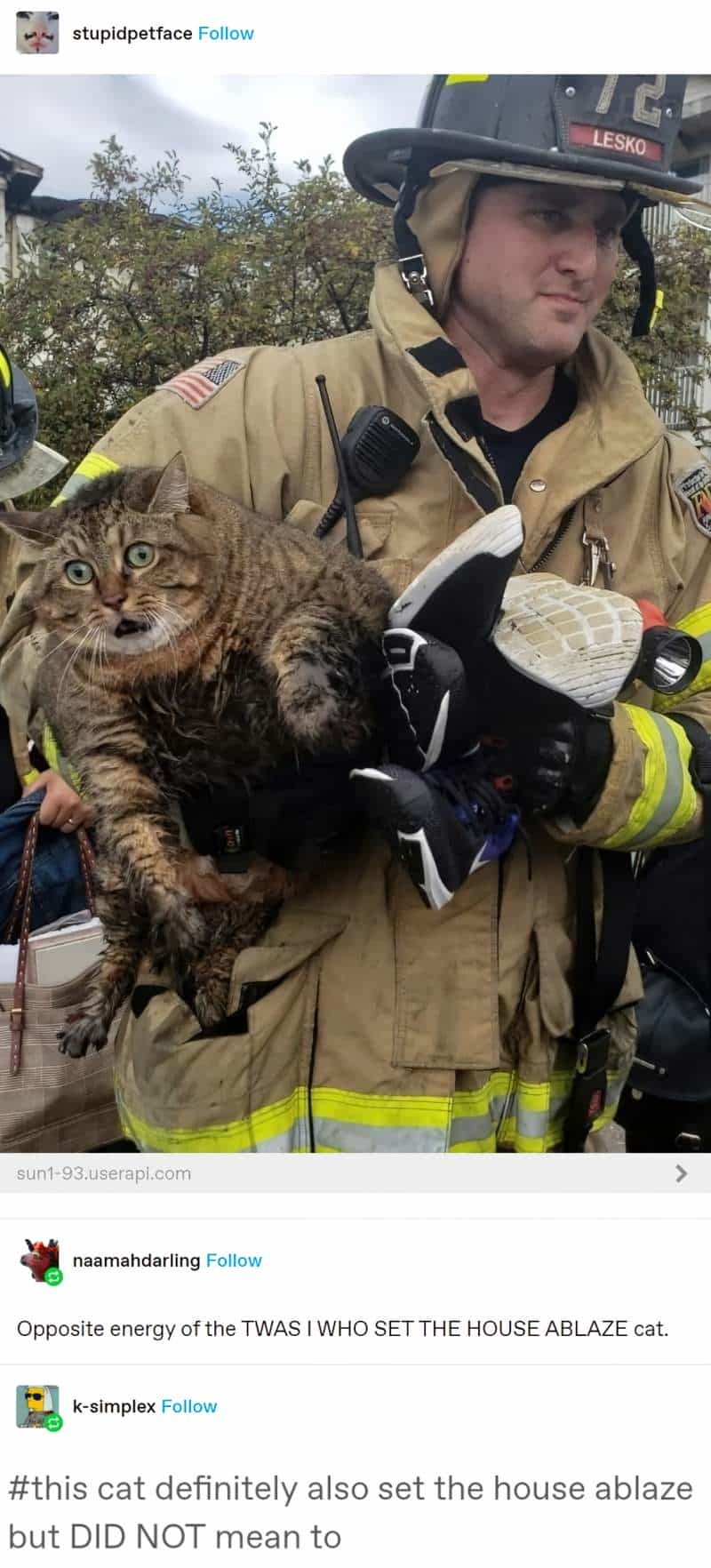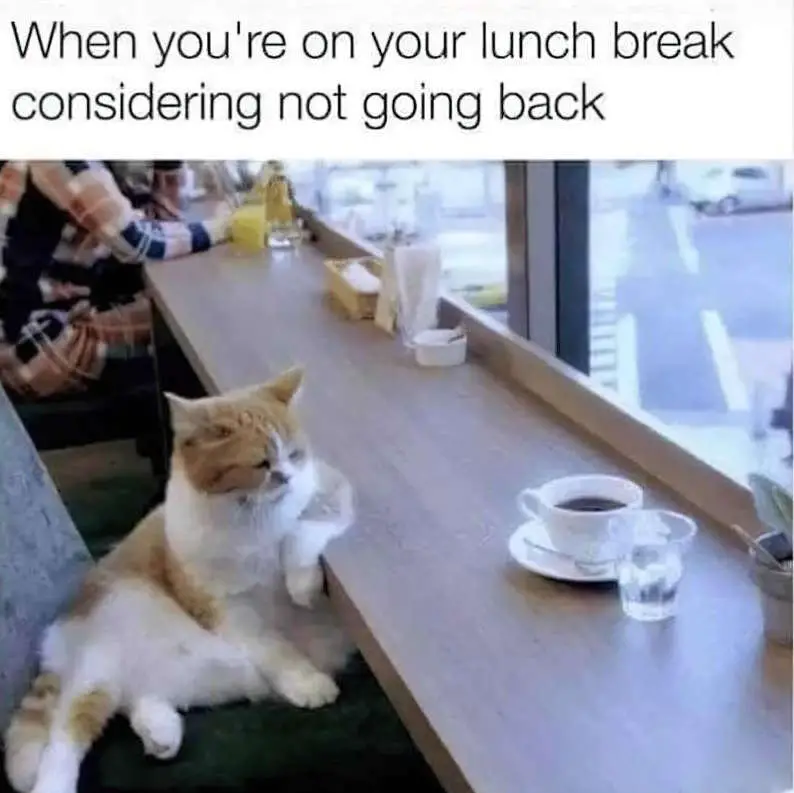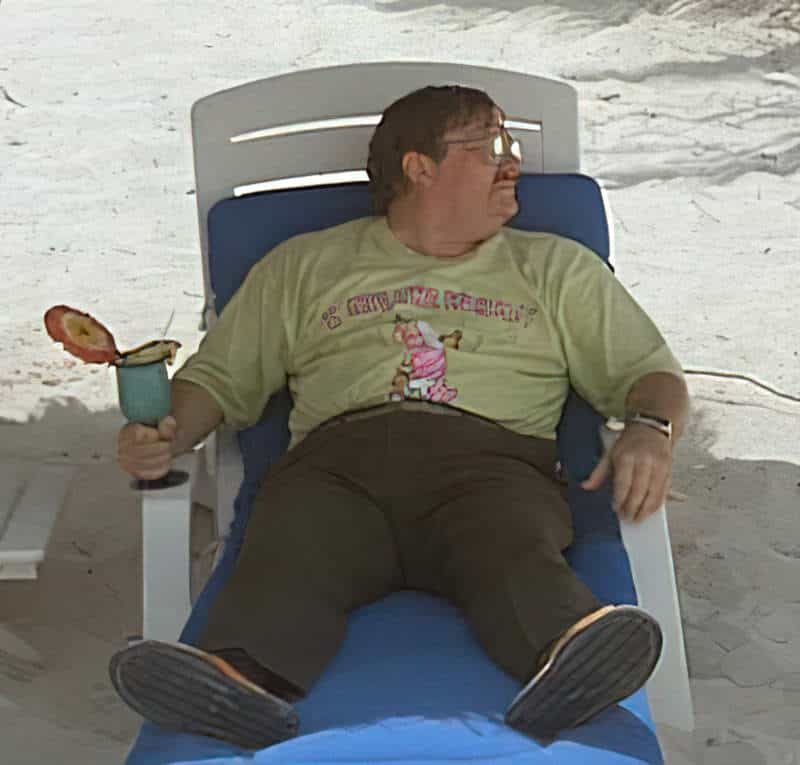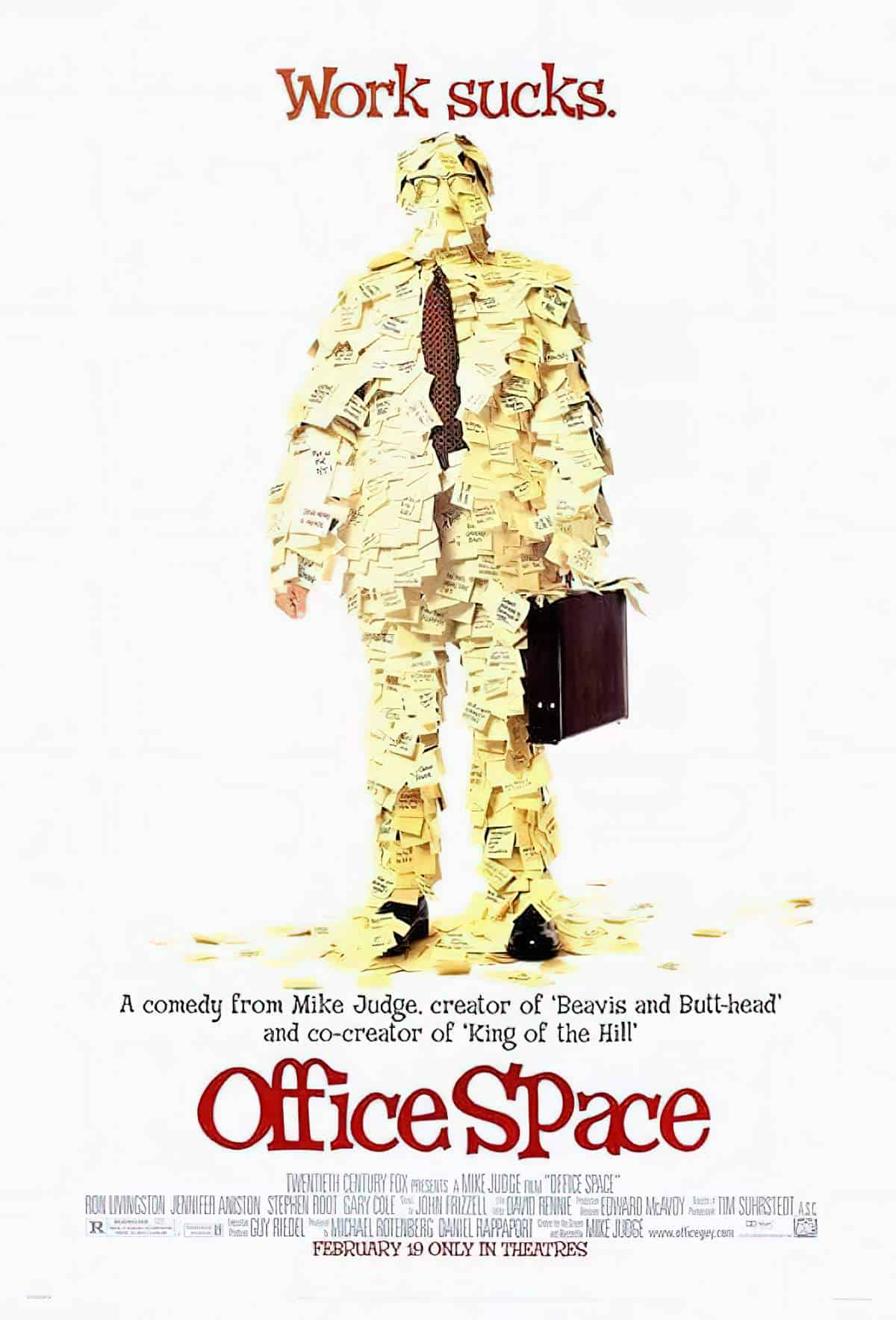Office Space is a 1999 comedy written and directed by Mike Judge. This is a film I go back to every few years, and each time I watch, I have a different viewing experience.
It’s one thing when you’re looking for an apartment to, you know, know what those fees are. But once you’re in a place, landlords know that you’re kind of in a spot. Say somebody charges you a fifty dollar “January fee”, and you know it’s B.S. but what are you going to do? Move, because of this fee? These nonsense fees end up adding to our cost of living.
I was interviewing a guy once about junk fees baked into cable bills and he said the largest corporate theft is not a company stealing a lot of money from a single customer. It’s companies stealing pennies from thousands or millions of customers.
When will the streamers’ content river run dry? from the Make Me Smart podcast, Friday 21 July, 2023
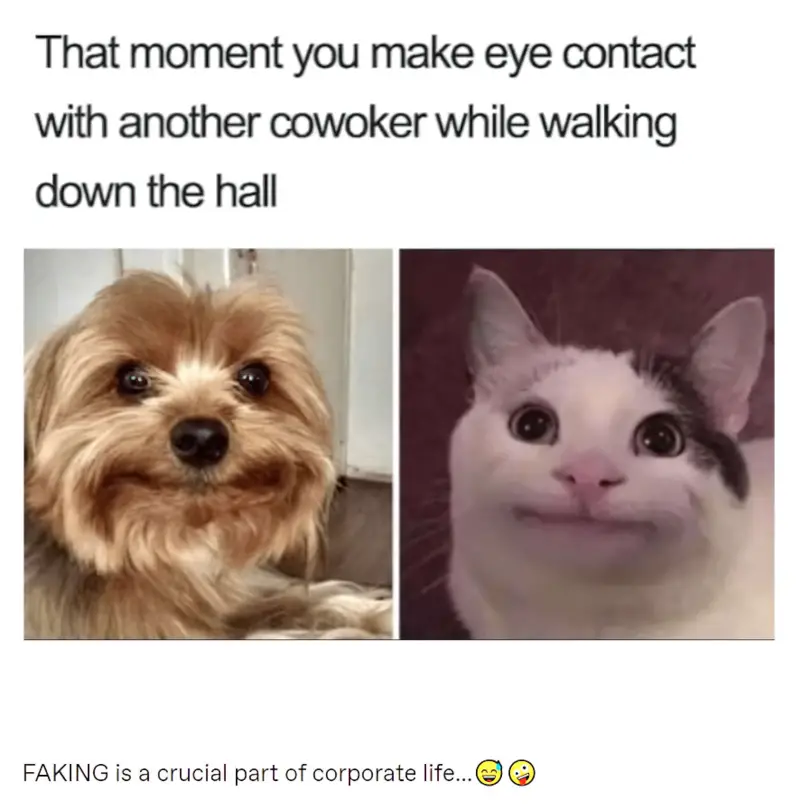
OFFICE SPACE AS A CLASSIC Y2K MOVIE
Are you old enough to remember Y2K?
I was a young adult at the end of 1999, on student exchange from New Zealand to a remote part of Japan. I was living alone in a one-room apartment across the road from the university where I was studying Japanese linguistics.
Campus sits at the bottom of a picturesque mountain. Despite its proximity to a university full of young adults, the walking track attracted a gaggle of very chatty and very fit Japanese elders. I soon worked out that if I became a regular at the mountain, they would talk to me in Japanese and this would improve my language skills. Too many of my peers assumed they’d have to speak to me in English — a problem specific to white people who go to Japan specifically to learn the lingo.
I never did learn much of the local dialect, because universities all over Japan teach ‘standard Japanese’ (which is really Tokyo Japanese). But insofar as I did learn to understand the mutterings of old men from north-western Kyushu, it happened on the mountain.
Whenever it rained, long, slimy creatures emerged on the walking track. I’d never seen the like. Shocked, I told one of the old men I’d just seen a bunch of snakes. (Coming from New Zealand, I had never seen a snake.) He told me it was probably just a ‘mimizu’. I didn’t yet know this word, so back at my apartment I looked it up in one of my massive dictionaries — this was before Internet access and long before smartphones — and discovered that the ‘snakes’ were just massive worms.
I’ve since learned that New Zealand also has a giant variety of worm. See: ‘Stuff of nightmares’: Boy’s incredible find in New Zealand backyard in the New Zealand news. The fact that a worm makes national news in NZ speaks to their rarity, and why I never saw one growing up.
In other animal news, one day I went walking up this Japanese track at dusk and was startled by a wild boar. I’ve never run so fast up a vertical incline. The boar wasn’t actually chasing me. But it might have. The track gave way to a sheer drop. I’d been about one metre away when I noticed the boar’s proximity to me, with its freaky eyes and its enormous tusks. As it happens, New Zealand has its share of terrifying feral pigs which are far larger than the Japanese specimen I encountered, but I tell you, when it’s nearly dark and you’re just one metre away when you discover it, any kind of wild pig creature will haunt you.
This mountain was popular not just for the socialising and the beautiful walking track with its funky-looking mushrooms and prolific wildlife, but also for its delicious water supply. A tub with taps had been installed at the bottom — few places in Japan are truly wild — and I would fill up my bottle there each morning to save buying water it from the supermarket and lugging it home even further. (I’m pretty fussy about the taste of my drinking water as I grew up in a town with an artesian supply — the best in the world.)
On the last day of 1999 I went to fill up my 2L drink bottle for the day and was shocked to see a lengthy queue. It seemed every local in town had descended upon the fresh water supply and were not just filling up their drink bottles, but each had come with massive tanks, as if preparing for the apocalypse. I knew what it was about. Everyone had been talking about Y2K for months.
It seems extraordinary now, but the collective worry was that the world would shut down at midnight. We had become reliant on computers by that point, but 20th century software had been coded with just two digits to store the last two numerals in a year. So it was up to individual companies to sort this issue out before software failed to execute — software which ran our electricity and water supply and everything else we now need for survival.
I remember waking up on the morning of January 1, 2000 and using my senses to check if anything about my surroundings had changed. Everyone’s read a story about waking up to find you’re the only person left on Earth. Turns out there’s a reason why pretty much every sci-fi short story collection ever published contains one story with that approximate plot.
The world outside was deathly silent, but not because anything calamitous had happened. Despite understanding the nature of Japanese New Year traditions on an intellectual level, I hadn’t realised the extent to which rural Japan completely shuts down over the New Year period. The suburban mall near my apartment was of course empty. No cars drove by. No buses. not that there had been many beforehand. All of the students in my apartment block had gone home because, for Japanese families, New Year is like Christmas. I hadn’t been in Japan long enough yet to have made proper friends.
So for me, the beginning of the millennium is memorable for my bountiful supply of fresh drinking water and absolute dearth of anything decent to eat. It was a fair hike to the nearest supermarket and back on foot, and I had been in the habit of purchasing two days’ supply of food at a time. By the third day of shut down I was out of food. Despite living next door to a big general store, kind of like K-Mart, the supermarket was much further. Unless I wanted to hike to the supermarket and purchase from a vending machine, I had nothing to fill my belly except for a couple of mochi cakes from some rice pounding festival I’d attended in the lead up to New Year. ‘Pounded rice’ describes mochi perfectly because that’s exactly what it is: Literally a ball of glutinous rice which has had the ceremonial crap pounded out of it. No flavouring. By the third day of shutdown the leftover mochi were hard as rocks. I’d never intended to eat them. But eat them I did.
I spent that quiet first week of the new millennium alone in my apartment reading A Prayer For Owen Meany, and frankly, I like my peace and solitude. I would’ve been content about the whole deal had I the foresight to make that extra trip to the supermarket when everyone else was gathering their supplies.
Most people, I believe, had a similarly uneventful New Year as the world ushered in the year 2000. That’s because corporations had done the work of preparing for a new date format.
See: 20 Years Later, the Y2K Bug Seems Like a Joke—Because Those Behind the Scenes Took It Seriously.
Office Space, directed by Mike Judge, is a film of its time: The farcical comedy of a man who has been employed in the short-lived tech boom which led into the early 2000s. Peter’s entire job is to make sure that calamity does not befall the corporation he doesn’t care about, and who clearly doesn’t care about him.
There are many invisible jobs like this — jobs where you never see the results of your own labour, partly because you’re one small cog in a massive wheel, and partly because your job is preventative, measured by what doesn’t happen rather than what does.
Audiences don’t have to have worked for a corporation like Initech to understand this aspect. I think back to my student days as a cleaner, when I cleaned lecture theatres and offices in the small hours of the morning. Cleaning is also one of those jobs where no one knows you exist until one tiny thing doesn’t get done. And then you hear all about it. Housework is like that; parenting is like that. Teaching is like that in some ways, because you don’t get much gratitude in real time from students. Only when you meet them years later can you see the results of their education, the fruit of your own labour.
Fast forward to 2023. It’s easy to look back on the 2020 covid lockdowns as an unnecessary joke, just as Y2K felt like a joke.
Our attention naturally rested on what might happen. Next we switch to what does happen. We ignore whatever would have happened but didn’t due to preventative measures taken. Mass death. A mass disabling event. And now we’re back to visiting doctors’ surgeries unmasked. (Not me. Never again, probably, because some people were disabled by it.)
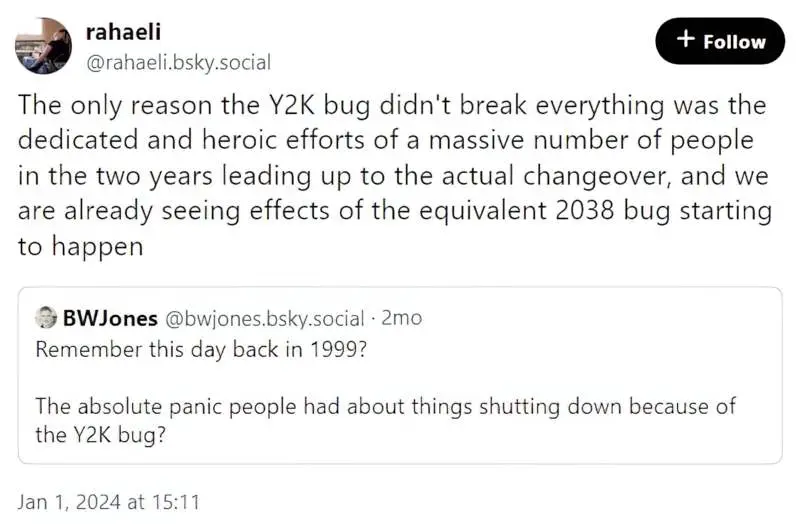
The year 2038 problem (also known as Y2038, Y2K38, Y2K38 superbug or the Epochalypse) is a time computing problem that leaves some computer systems unable to represent times after 03:14:07 UTC on 19 January 2038.
Year 2038 Problem, Wikipedia
1999 HUMOUR
Office Space remains a highly memeable show:
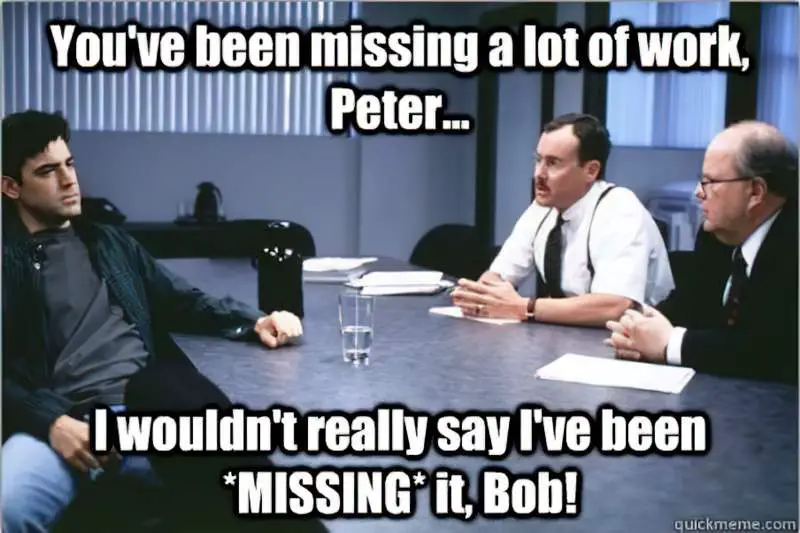
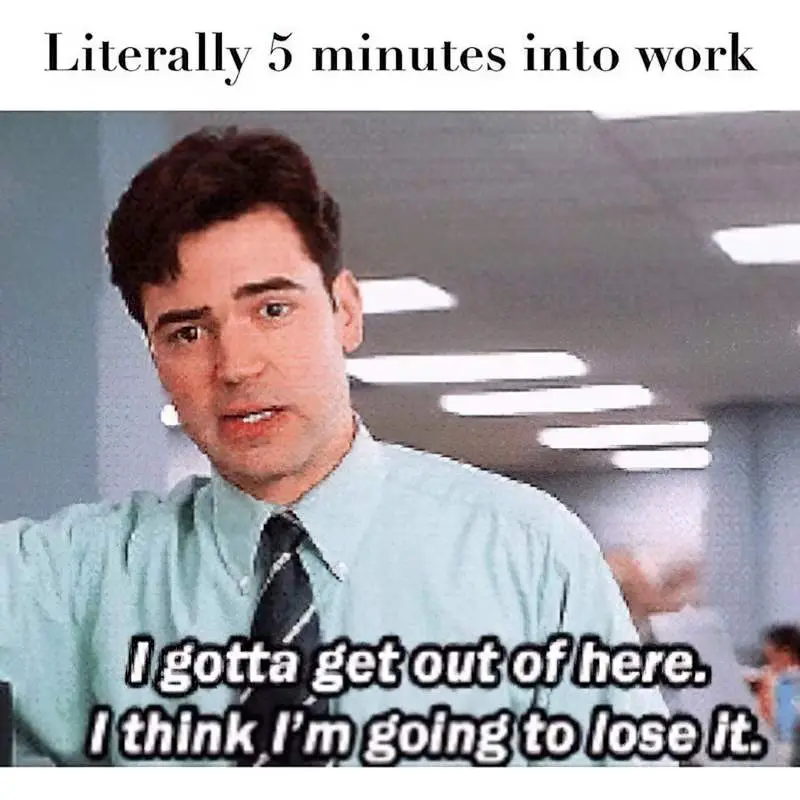
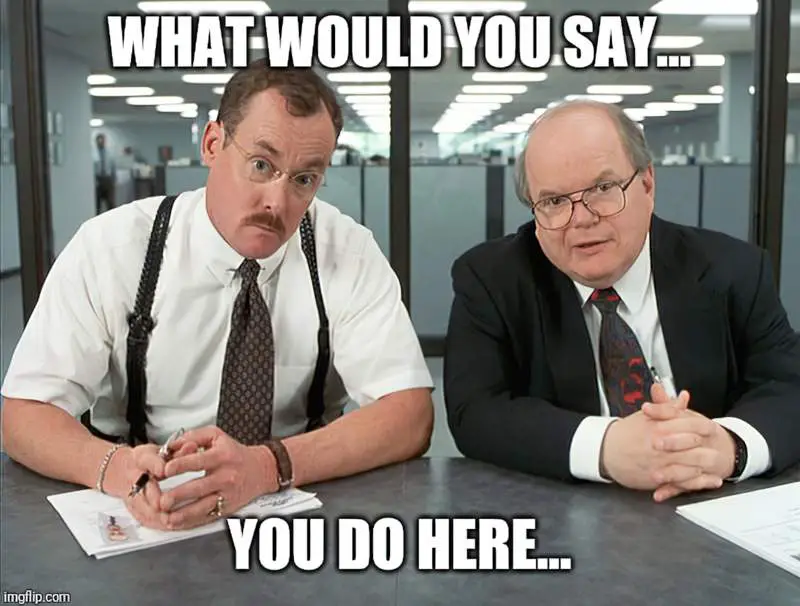
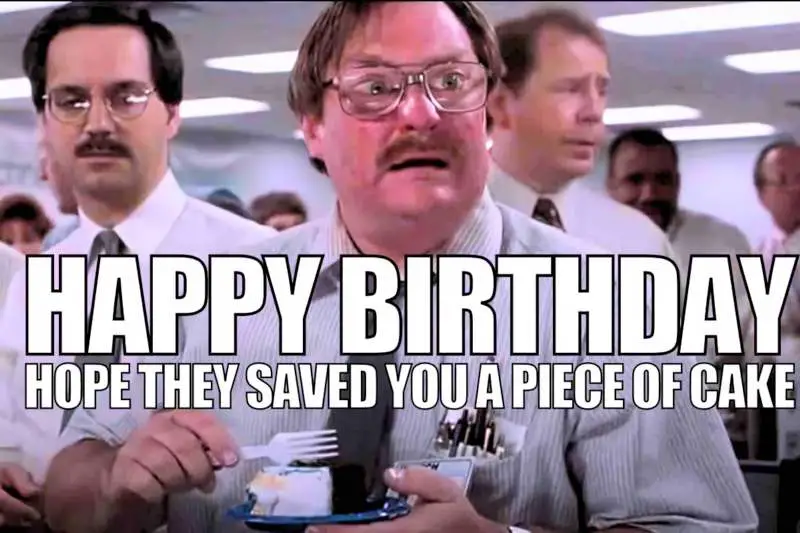
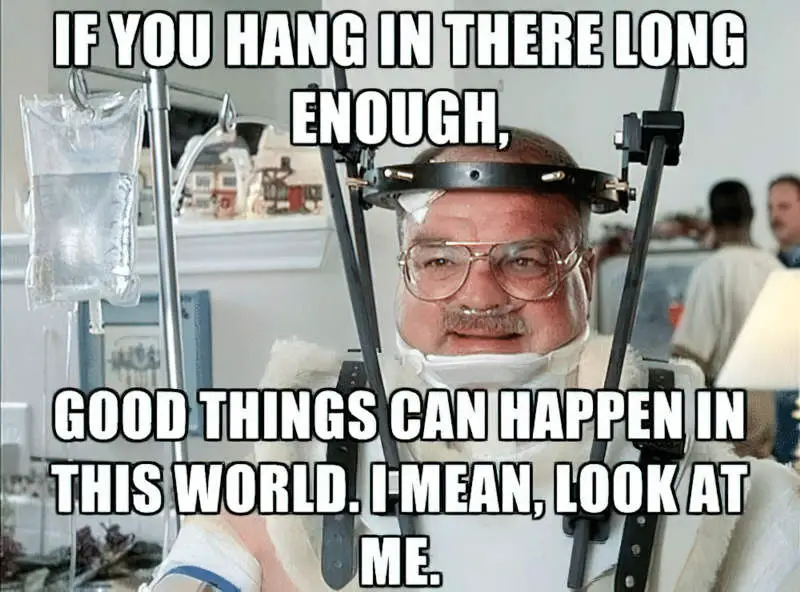
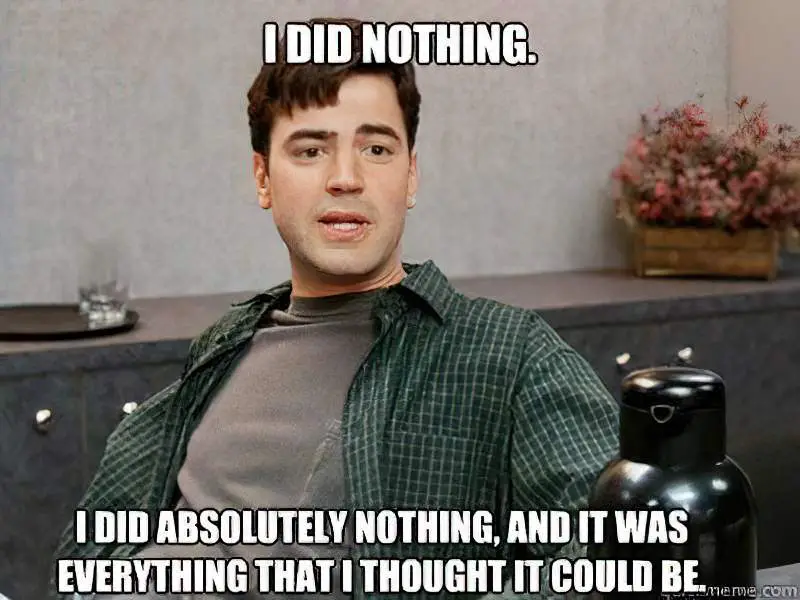
Old films can show us how far the culture has come, especially when we take a close look at the humour.
Considering Office Space came from the mind of Mike Judge, best known for Beavis and Butthead, Office Space is relatively inoffensive. Still, if you watch it now, be prepared for some jokes which no longer fly.
I wonder how gender representation would be different if a similar film were made today, and put it to you that one of Peter’s trio would have been a woman, probably a woman of colour.
Each time I’ve watched this film I notice it more and more: Of the few women in the cast, two are outright annoying. The film is full of annoying co-workers, but the men aren’t annoying for their masculinity — rather, for their lack of it (e.g. Chotchkie’s male waiter).
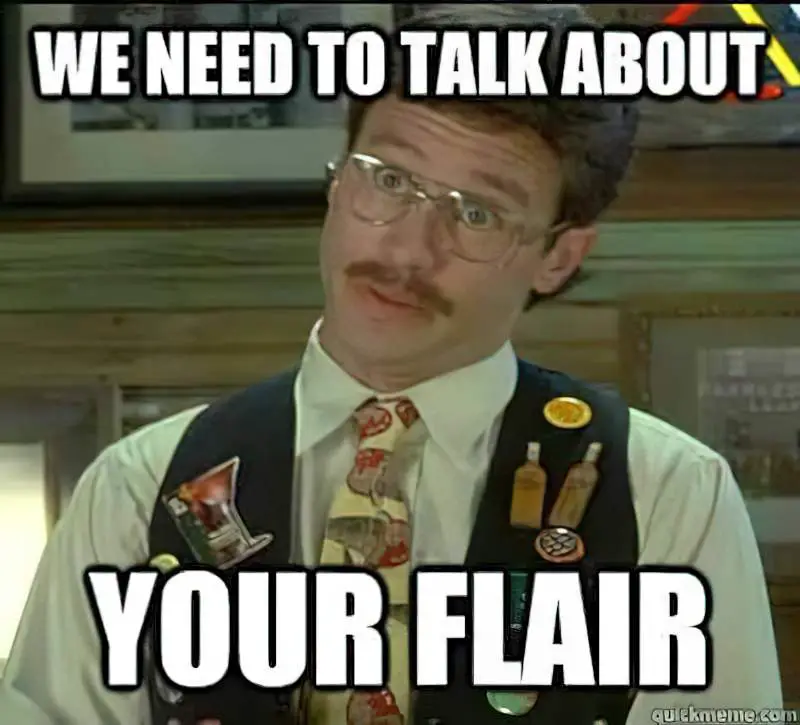
Likewise, the woman who answers the phones (“Just a moment!”) is annoying precisely because of her high-pitched, feminine voice and another is annoying due to her motherly manner in the workplace, in which her co-workers are infantilised (especially Milton). Lumbergh, the arch villain of the workplace, is not annoying because of attributes which make him a man, or a father. The scope of his annoyance is limited to what we see of him in the workplace. He doesn’t exist outside that sphere and, in fact, when Peter does imagine Lumbergh outside the sphere of work, he is disgusted by it.
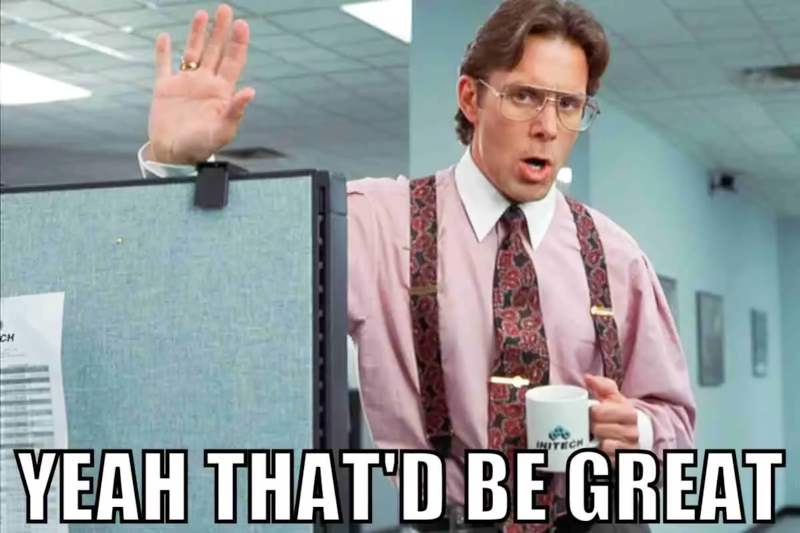
Peter’s girlfriend Anne is a cranky wife archetype with unrealistic expectations of our sympathetic mimetic hero who faces pressure from all sides. Problematically, this isn’t overtly attributed to the pressures of toxic masculinity, in which men are unfairly expected to earn a high income before justifying their own gender identity. Blame for this particular pressure rests partly on the corporation and partly on harpy wives with mental health issues (in this case anorexia, evoked without empathy).
The love interest, played by Jennifer Aniston, conforms to how Gillian Flynn later described the Cool Girl.
When it becomes likely that Peter will go to prison, Lawrence yells, “Watch your cornhole, dude!” Prison r*pe jokes are, I would hope, less acceptable now.
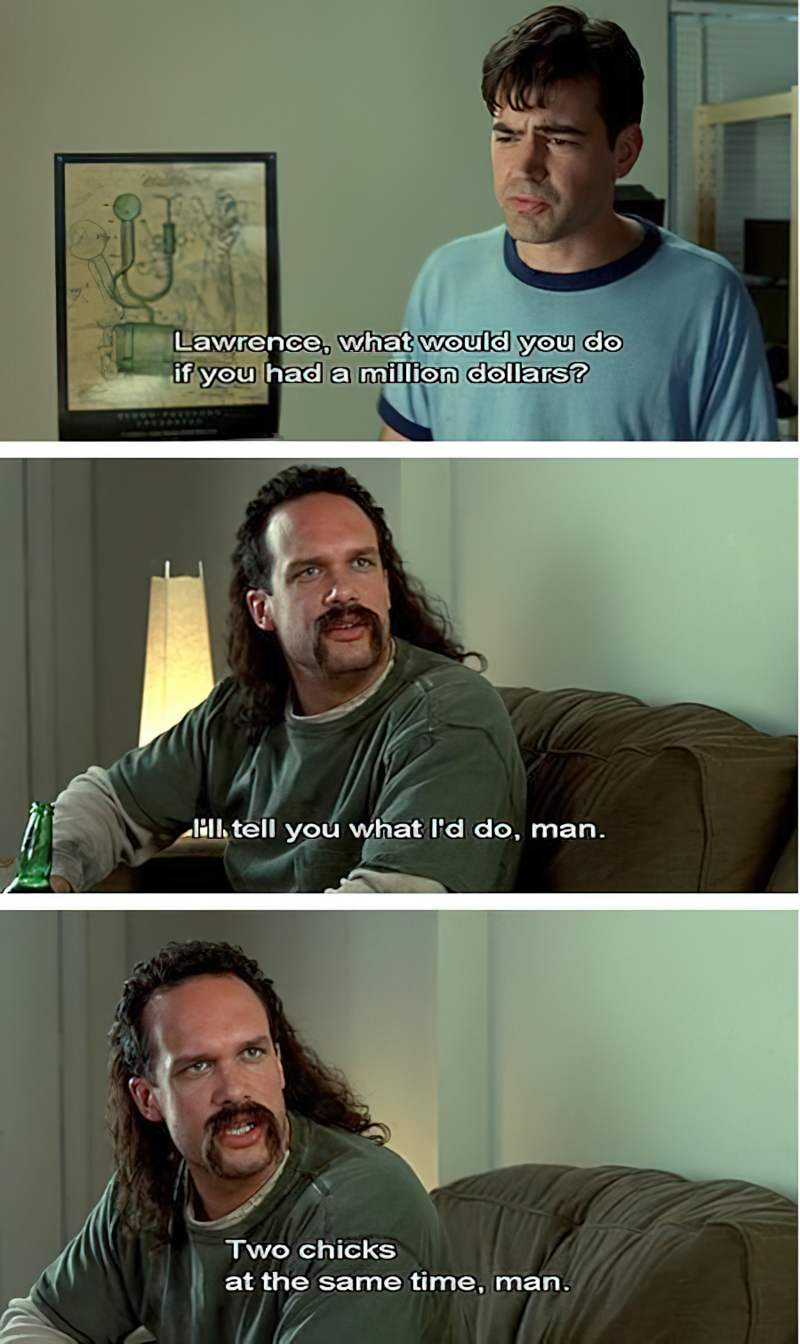
PATRONS ARE STILL RUDE TO WAIT STAFF
I remember back when I was working at Chili’s I would get cursed out by customers over the most asinine stuff. Corporate 86’d caesar salads and somehow that was my fault. 50¢ upcharge on sweet potato fries got me cursed up one side and down the other. And when they took away free.
Chips and salsa at the bar it was complete and utter pandemonium. You’d think I had k*lled someone’s dog with the shit people would say to me. And don’t even get me started on the side work management required. All for $2.13 an hour…
@ERnurse86, 11:45 PM · Oct 2, 2023
WOMEN ARE STILL SEEN AS AN ABERRENT PRESENCE IN THE CORPORATE WORLD
In Office Space, women take on the mothering duties. Conversations about the world of work happen between men. The woman who answers the phone is annoying partly because of her high-pitched female voice, and because she is seen as a mother, everything she says will be construed by Peter as infantilizing.
Continued progress is not inevitable. Despite advances in education, women remain trapped in lower-status, lower-paid employment. The same old Medieval barriers – care burdens and fraternal capital – scupper 21st century progress. As long as social reproduction is outsourced to women, they tend to ‘choose’ university courses and career paths that are compatible with care. Even when mothers apply for managerial roles, European and North American employers tend to discriminate. Fathers incur no such penalty. Gender (not race) is also the primary cause of black women’s lower earnings. Men are uniquely able to capitalise on (high-paying) jobs with longer hours, and so they leapfrog up the corporate ladder. Yet regardless of productivity, men are more likely to be promoted if their immediate boss is a man.
Smash the Fraternity by Dr. Alice Evans
Updated: Oct 27, 2022
AUTISTIC CODED CHARACTER: MILTON WADDAMS
In 1999, few members of the movie-going public had heard of Autism, or Aspergers as Milton would have been known at the time. (Come 2013, the Aspergers label was rolled into Autism in the DSM.) The DSM 4 had been published in 1994, which included Aspergers Disorder for the first time.
But due to wider Autism awareness (if not acceptance), the character of Milton will be decoded by modern audiences as an Autistic comedic archetype.
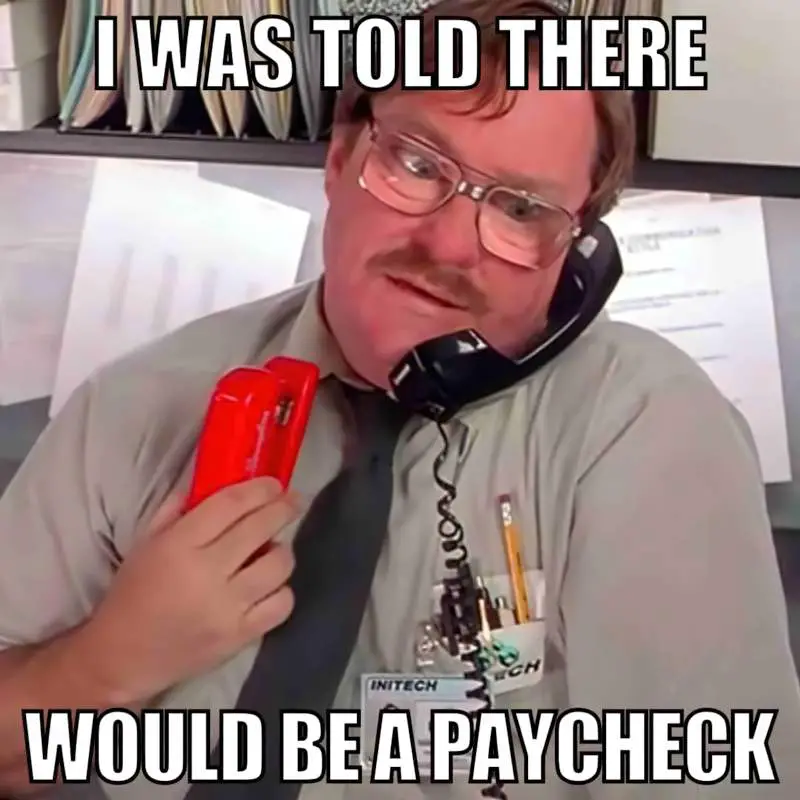
Pretty much the worst thing you can do to an Autistic employee is force them to constantly change plans. As soon as Milton gets settled in his new spot, with his environment set up to deal with sensory issues, his bully boss decides to torture him by making him move again. Note that Milton playing his radio “at a reasonable volume” may annoy others, but I put it to you that Milton plays his radio to avoid the sensory torture of noises coming from other people.
Milton’s attachment to the red stapler turns him into a hyperbolic comedy sketch of an Autistic person just trying to keep his environment same enough to get by, and we can read this as a coping mechanism. His desk constantly changes, but so long as he has that stapler, he’ll avoid a meltdown.
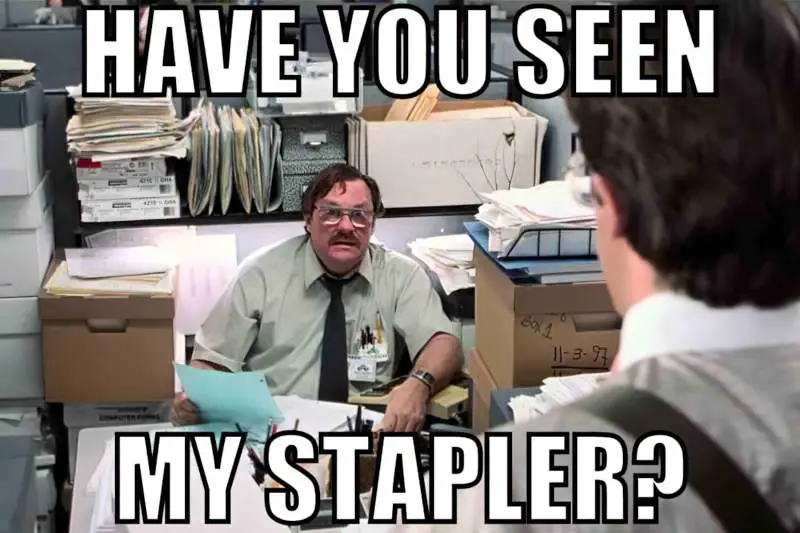
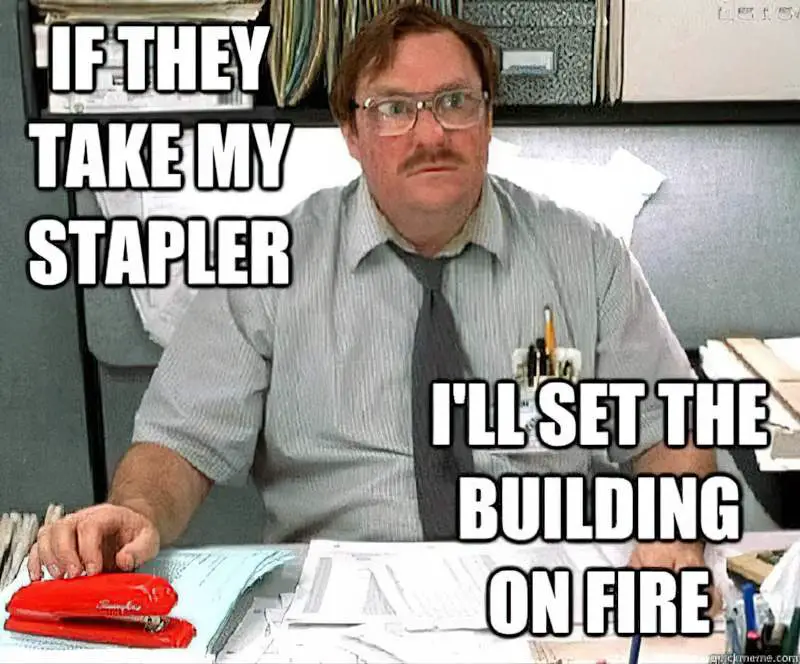
Milton is depicted as a childlike figure who takes the bus to work, probably because he has never gained a driver’s licence. We know nothing of his life outside work, but we can imagine he lives with an elderly mother and has never experienced sex or romance, possibly because those normative things don’t interest him.
Milton is relatable even if we don’t relate to him much. The experience of having your tools for work taken is common to many in the workplace.

In any office job there are always coveted workspaces and less desirable seats. It’s easy to envy others with a better spot.
Whether we empathise with Milton or find him annoying, it is gratifying to see Milton accidentally get away with arson and theft, living it up on a tropical island. In a nice final touch, we see Milton make a nuisance of himself with the wait staff at the resort. His sensory issues require drinks be served in a very particular way. Milton got his own “breaking bad” character arc, and we can imagine he’ll go from place to place creating havoc until he gets caught. But we hope he’s never caught, right?
See also: From Rain Man to The Maid — Autistic archetypes in contemporary fiction.
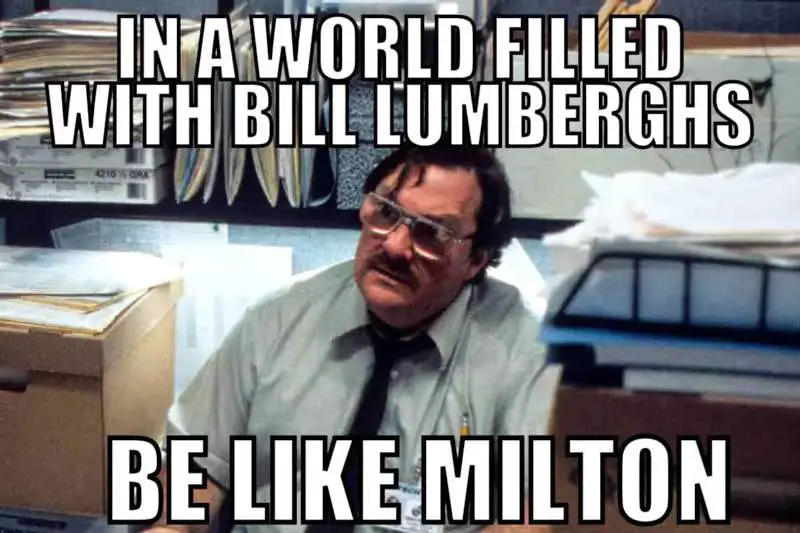

THE IRRITATION OF TECHNOLOGY
As we become increasingly reliant upon technology, no matter how much more reliable technology becomes, we continue to find it annoying. Twenty years ago, getting a dot matrix to talk to my PC was a pain in the neck. These days, with wireless connection, the particular problems experienced by Michael are gone, but my printer continues to scam me by charging ridiculous prices for cartridges, which dry up at a time specified by the manufacturer. If I don’t replace one of the cartridges, it refuses to get by using the others, when it absolutely could.
The “P.C. Load Letter” scene was not scripted. David Herman had more lines to say to Ron Livingston, but he was interrupted by the printer jamming and didn’t understand what the error message meant.
IMDb trivia
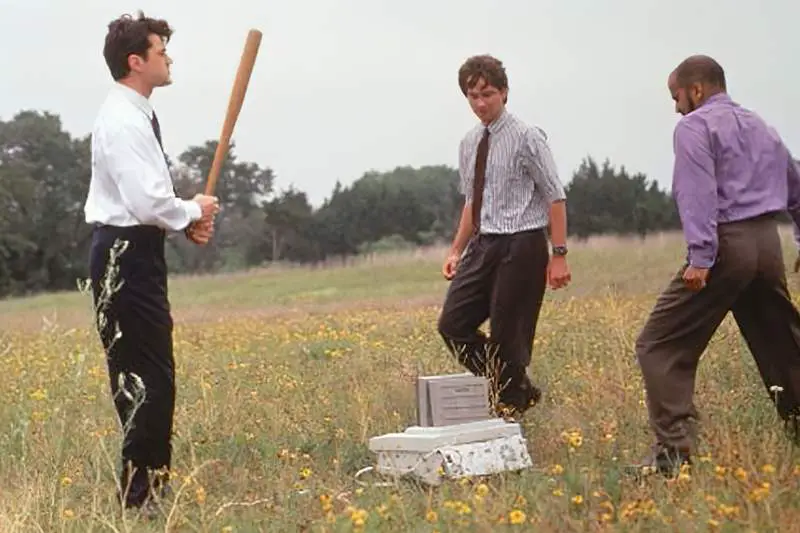
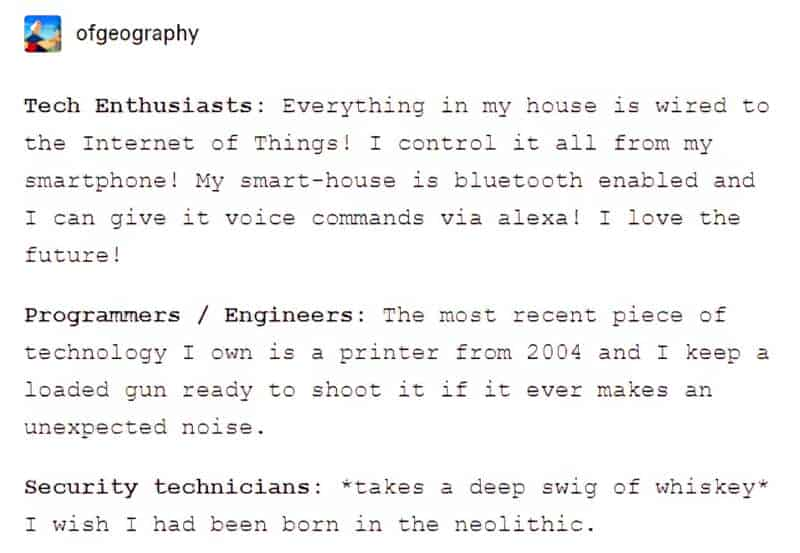
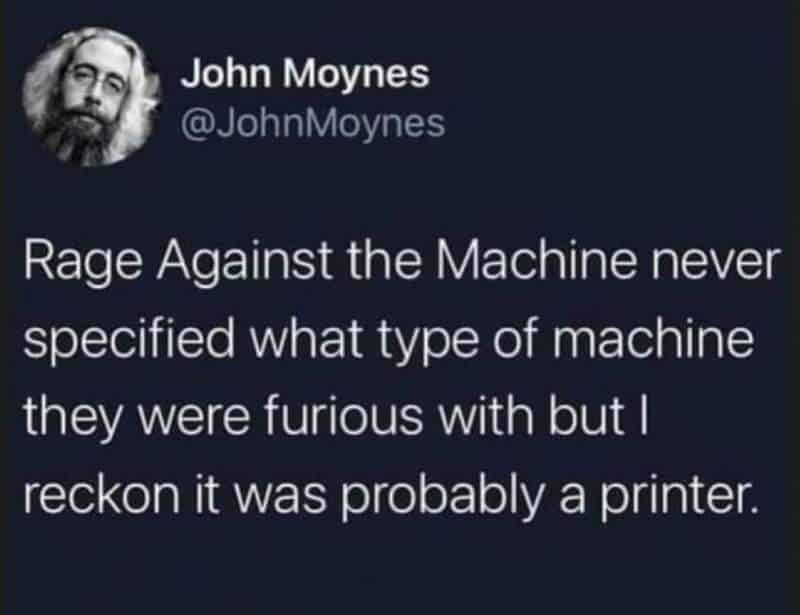
BROKEN PROMISES
As someone who belongs to the same generation as Peter, Michael and Samir, the scam was only just beginning. Now, an entire generation of younger workers have been told that so long as they work hard, and qualify themselves specifically to work in jobs created by industries and corporations, they will make it in life. Saddle with debt, many have been let down by not one but two global crises, and the ‘work hard, do well’ promise has been unveiled as a lie.
This is especially the case in China, with an enormous population of very highly-trained professionals forced into mundane labour:
There are millions of [Chinese people] who are graduating every year — children of the one child policy whose parents have set them up for well-paying jobs, but the jobs that are available — to the extent that there are jobs — are blue-collar, working class jobs, not the white-collar tech jobs they’ve been told to aim for. So where we are now is just a far cry from the decades of phenomenal growth, which was the prevailing story of China for the past forty years.
[China’s President Xi Jinping] came to power in 2012. At that time the Chinese economy had been open to the world for just over 30 years. It was booming. The country’s economy was growing by ten percent, or more, year on year, on average. Since his ascension though, things have been pretty bumpy. There’s been no more double-digit growth. There have been a couple of major economic setbacks, notably in 2015 when there was a big stock market crash, which was pretty scary. And the government’s response to each of these setbacks was… “Build lots more stuff, particularly apartments”.
But the other thing that I think came out of that crash was it fired suspicion among Xi and the party, of the free markets. It made them less inclined towards the previous model of ‘Capitalism With a Chinese Face’.
At the same time, Xi saw what was happening in America and elsewhere with tech giants like Twitter and Facebook amassing massive amounts of power. … Facebook played a clear role in the outcome of the Trump election. So Xi and the party have become increasingly wary of particularly American style capitalism. Recently we’ve seen them cracking down on big American companies, particularly tech firms in an effort to bring them to heel. And it’s fair to say that foreign investors are increasingly wary of getting into China. Foreign investment in China for the most recent quarter was down 87% compared with the same period a year ago.
On top of this, Xi was responsible for the very hardline response to covid. And it really hasn’t recovered from those years of harsh lockdowns.
The other thing is that China hasn’t pulled the trigger on any sort of stimulus package that we’ve seen in the past. They’re not building a bunch of new roads and so on. In large part, it simply reflects the fact that China can’t afford this kind of stimulus anymore. Because [the country] is crushed as a result of all the debts incurred as a result of that past investment in construction and so on.
How China’s tanking economy will hurt Australia, Mike Seccombe, 7am Podcast, The Saturday Paper, 29 August, 2023.
When Peter decides to ‘improve’ his life by ditching the corporation and returning to hard labour on the land, I can no longer see this trajectory as a happy ending. Sure, the character of Peter may have chosen this for himself, but there are many millions more who did not.
THE DAILY COMMUTE
urban sprawl tends to have higher infrastructure costs than other forms of development, but the thing that makes it “sprawl” rather than just a new town with an amorphous boundary is the implication that it’s oriented toward the urban core; that it’s just an endless expansion of the municipal cortex rather than a satellite community that operates like a self-contained town. this is often bad, though one has to ask “compared to what”.
infrastructure maintenance is a real issue, but the initial buildout is often developer-financed nowadays. the real killer is commuter infrastructure. The basic premise of urban sprawl is that these are vestigial bedroom communities and everybody commutes into the urban core to work and whatever else, right? This is a problem: commuter infrastructure has hard limits on how many people it can support, expanding commuter throughput is prohibitively expensive, and because we’ve decided (due to the political power of suburban voters) that commuter roads should be a first-come-first-served commons, sprawl is a recipe for wasteful gridlock that’s bad for the environment, bad for safety, bad for municipal budgeting, and bad for the people stuck in traffic. People who buy in these regions because they’re affordable rarely spend much time testing the rush hour traffic, so it’s easy to overcommit to punishing commutes — which becomes the city’s problem, of course! Maybe a couple more lanes will fix it. This is the main issue, to my mind: “there’s the city and then there’s some towns around it” is a model that was old in antiquity, but people didn’t commute daily. At some point it’s insane to even think about doing this without high-speed commuter heavy rail, something politically impossible to build at the pace of sprawl, and in many cases impossible to build at all.
In principle, the pandemic could have been a reset for this, but people are freaking out about downtown real estate, so everybody has to go back to work. If fully remote work ever becomes truly big — or, for that matter, in-office work with a network of interconnected satellite offices! — that could turn what we call “sprawl” into something that works. The relevant question here is: how hard is it to live, work, and raise a family in this satellite community without going into the city more than once or twice a month? But right now, fact is, it’s hard. People buy in these places because they want to live in the city and they also want a nice neighbourhood with green space and calmed streets and low crime and affordable housing, and as long as you’re always building outward there comes a time when you can’t have all that anymore. Most cities of significant size got there ages ago, and now we’re just thrashing.
discoursedrome on Tumblr
Sprawl is among other things also really expensive for city budgets bc it makes providing infrastructure and services a lot harder.
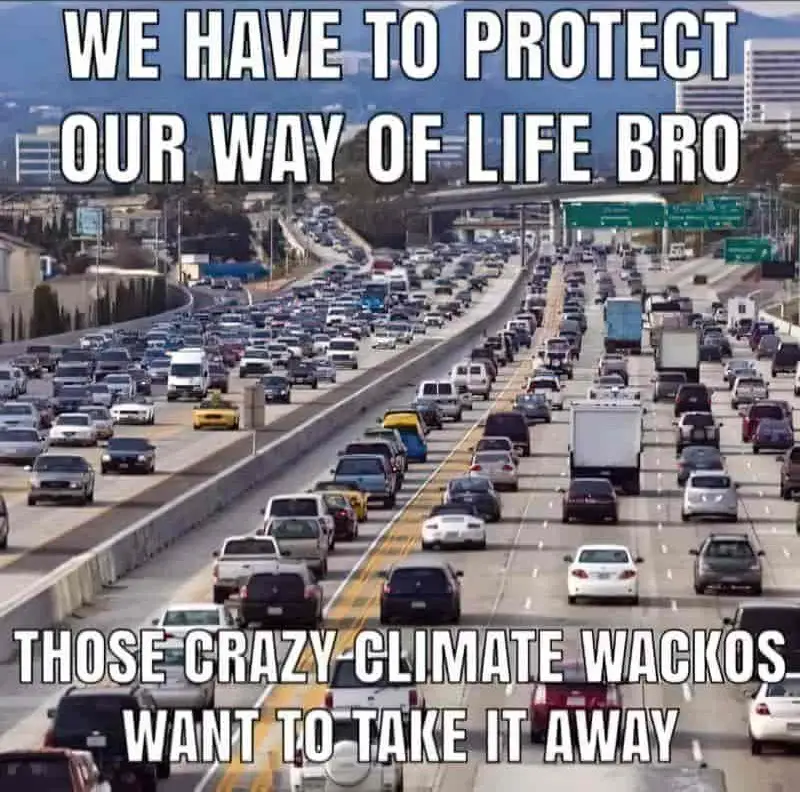
SEE ALSO
Man who was fired for refusing to participate in after-work drinks and team-building activities wins legal right to not be “fun” at work from Business Insider
Open Plan: A Design History of the American Office
Albeit inspired by a progressive vision of a working environment without walls or hierarchies, the open plan office has come to be associated with some of the most dehumanizing and alienating aspects of the modern office.
Jennifer Kaufman-Buhler’s fascinating new book Open Plan: A Design History of the American Office (Bloomsbury, 2021) examines the history of the open plan office concept from its early development in the late 1960s and 1970s, through its present-day dominance in working spaces throughout the world, examining the design, meaning, and use of the open plan from the perspective of architects and designers, organizations, and workers.
Using the progressive vision of the early promoters of the open plan as a framework for analysis, and drawing on original archival research and contemporary discussions of the open plan, this book explores the various goals embedded in the open plan and examines how the design of the open plan evolved through the late 20th century in response to various social, cultural, organizational, technological and economic changes.
interview at New Books Network
Comedy Against Work: Utopian Longing in Dystopian Times
Comedy is so frequently the topic of cultural dialogue, but it is rarely taken seriously as an object of study. Comedy Against Work: Utopian Longing in Dystopian Times (Common Notions, 2022) offers a major contribution to theorizing comedy but also thinking about the particular politics of the genre today. Work is a joke and often the butt of our jokes. Madeline Lane-McKinley argues that in comedy, we find ways to endure and cope with the world of work, but also to question the conditions of capitalist life. When work is slowly killing us and destroying the planet and, at the same time, something impossible to imagine life without, Lane-McKinley considers the possibility of comedy as a revolutionary practice. By appealing to laughter we can counteract many of our shared miseries under capitalism, including our relationship to work.
But to think through these revolutionary aspects of comedy, as a practice, also involves troubling comedy’s relationship to the global right turn of the last decade. Stand-up comedy’s claims to the artistic freedom of hate speech in comedy represent a fascistic current of our world today, blurring the boundaries between left and “alt” right. Against this current, Comedy Against Work draws from a tradition of feminist critical utopianism, Marxist-feminism, and contemporary cultural criticism to reflect on an anti-fascist poetics of comedy, grounded in a critique of work.
In this conversation with host Annie Berke, Dr. Lane-McKinley discusses the origins of her project, her decision to include her own story and life in her academic analysis, and the comedic virtuosity of the feminist killjoy.
interview at New Books Network
